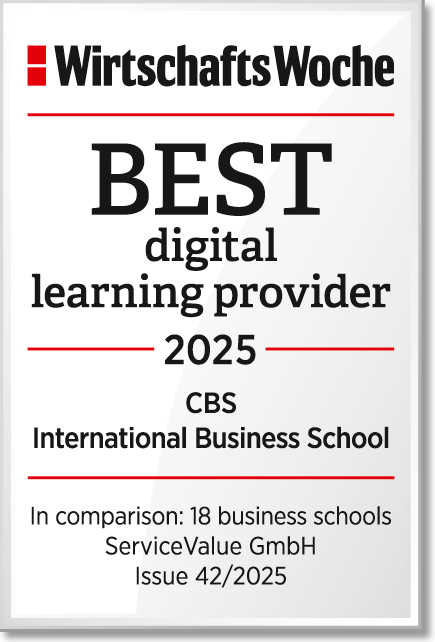Supply Chain & Logistics (M.Sc.)
Manage Global Supply Chains – Your Master’s in Supply Chain Management!

Your Master of Science in Supply Chain Management – A Gateway to an International Career in Logistics and Procurement
You want to understand how global supply chains keep the world moving and how innovation, data, and sustainability are redefining logistics? The Master’s in Supply Chain Management at CBS equips you with the strategic and analytical skills to design, manage, and optimise international supply networks.
At the heart of this Master of Science in Supply Chain Management programme lies the connection between operational excellence and strategic thinking. You will learn to design global supply chains that are both efficient and resilient, and to understand how digitalisation and sustainability are shaping the logistics of tomorrow. By integrating future-focused topics such as AI-based data research, you will develop into a sought-after leader at the intersection of business, technology and responsibility.
At CBS, learning is hands-on and globally focused. You’ll work on real company projects, develop strategic recommendations, and present to industry leaders. Professors with industry and consulting experience help you apply theory to practice and think like a global leader.
Studying in Germany gives you unique access to one of the world’s most advanced supply chain ecosystems, with Cologne connecting you to leading industries and markets across Europe. With a CBS degree, you’ll be ready to shape the future of logistics – smarter, faster, and more sustainable.
This study programme is part of our NEW ERA - Master programmes.
*Tuition fees differ for EU and non-EU students. For the specific fees please check the tuition fees information page. Status: April 2025.

What Sets Supply Chain Management at CBS Apart

Real Projects. Real Impact
Solve real challenges from companies like E&Y, UPS, and KPMG and present your solutions directly to decision makers.
Learn from Leading Experts
Learn from former C-level leaders, managers, and consultants who bring real-world leadership and consulting experience into the classroom.
NEW ERA Education for Future Leaders
The NEW ERA master concept links academic depth with hands-on application. You strengthen analytical thinking, decision making, and the ability to apply knowledge using AI tools and real business formats.
Study Globally. Work Globally
Study in an international community with students from 75+ nations and build the intercultural skills needed for leadership roles in global organizations.
Curriculum
Economic Analysis & Global Markets
6
ECTS
- Apply tools of economic analysis to understand market dynamics
- Gain critical insights into international trade, foreign exchange, and interests
- Analyse economic forces in trade policies and global markets
- Understand international capital flows and financial institutions
Strategy Development
6
ECTS
- Apply strategy-making processes and strengthen strategic reasoning
- Turn analysis into sustainable strategy
- Play the strategic chess of business with foresight
- Master decision-making from firm to network level
AI Based Data Research
6
ECTS
- Use AI to automate data collection and analysis
- Generate insights faster — with reproducible, transparent AI research pipelines
- Turn unstructured information into decision-relevant intelligence — at industry speed
- Apply data analytics and scientific methods to real data
Financial Investment Analysis
6
ECTS
- Analyse business models and annual reports of international companies
- Use relevant key ratios to evaluate companies
- Speak the language of management consultants, investors and private equity firms
- Use your knowledge to develop investment decisions and strategies
Global Supply Chain Management
6
ECTS
- Analyse and evaluate the performance of global supply chains
- Implement digitalisation, resilience and sustainability solutions for supply chains
- Optimise existing supply chains and develop new ones
- Align supply chain strategy with corporate goals
Empirical Research & Visualisation
6
ECTS
- Design attractive visual narratives that effectively communicate research findings to stakeholders
- Apply visualisation best practices to present empirical evidence in formats that engage audiences
- Master research design principles and methodologies to investigate business questions
- Analyse quantitative and qualitative data using statistical tools to derive meaningful insights
Logistics 4.0
6
ECTS
- Analyse internal and external supply chains and master digital transformation principles that revolutionise logistics operations
- Become familiar with advanced technologies like IoT, AI, Digital Twins and possible applications in logistics and supply chains
- Design smart logistics systems that increase efficiency, reduce costs, and improve customer service levels
- Assess challenges involved in digital transformation of supply chains and logistics
Product Development & Innovation
6
ECTS
- Transform customer insights into innovative products that address real market needs
- Lead through the development lifecycle from ideation to market launch
- Apply innovative concepts and solve complex problems to create user-centered solutions
- Evaluate market opportunities and validate product-market fit
Business Model Analysis & Industry Comparisons
6
ECTS
- Adopt a holistic view of corporate business models
- Integrate knowledge from your studies into real business and industry analysis
- Develop practical, cross-disciplinary solutions to complex cases
- Solve complex business model challenges
Managing Change with Projects
3
ECTS
- Become a project manager who contributes to value-based business development
- Set up projects to solve real problems and use project reviews
- Apply the techniques and methods that make projects successful
- Achieve change with change management methods
Leadership & Executive Development
3
ECTS
- Learn core leadership concepts and latest research insights
- Combine scientific principles with practical tools for effective leadership skills
- Strengthen your personal leadership profile through communication skills and confident decision-making
- Develop an understanding of leadership skills for modern organisations
Event Lab
3
ECTS
- Develop an event (TedX/leadership/team building/company/else)
- Design and carry out the event marketing to potential participants
- Organise the event and carry it out in concrete terms
- Perform the event review & retrospective
Project: Consulting a Company
9
ECTS
- Receive a consulting challenge from a real client company
- Define and scope a real consulting project in a team
- Develop evidence-based solutions and actionable recommendations
- Present your recommendations to the client company
Managing Operations, Processes & Technology
6
ECTS
- Design efficient operational systems that optimise resources and deliver consistent quality
- Implement process improvement methodologies to increase organisational performance
- Build operational strategies that align with business goals and create sustainable competitive advantages
Sustainability & Corporate Responsibility
6
ECTS
- Discuss corporate responsibility for social and environmental developments
- Apply stakeholder and double materiality analyses for sustainable strategy development
- Integrate ESG criteria into leadership and decision-making processes
- Strengthen resilience, leadership, and communication through sustainability
Strategic Human Resource Management
3
ECTS
- Develop a strategic alignment of HRM practices
- Consider current HRM trends and best practices
- Get familiar with strategic HRM analysis
- Apply modern methods of HRM
Facilitation, Communication & Negotiation
3
ECTS
- Analyse negotiation scenarios systematically and design effective strategies
- Understand communicative and economic factors that influence negotiations
- Learn how to strategically prepare, conduct and evaluate negotiations
- Develop persuasiveness, tactical thinking and decision-making skills in complex settings
Entrepreneurship & Venture Lab
6
ECTS
- Develop and test innovative business ideas
- Implement the Lean Startup methodology
- Cultivate entrepreneurial thinking
- Develop and define scalable business ideas
Management Simulation Game
6
ECTS
- Lead a virtual company in a simulation
- Make complex managerial decisions
- Assess the impact of business decisions
- Anticipate competitor reactions
Master Thesis
18
ECTS
- Demonstrate mastery of your field by conducting independent research that addresses a relevant business topic
- Apply strategic frameworks and methodologies to analyse complex problems and develop evidence-based solutions
- Synthesise knowledge from multiple disciplines to generate insights and recommendations
- Communicate findings professionally through rigorous academic writing
One Master. Three Tracks
Your career goals are unique, and your study path should be too. That’s why we offer you full flexibility: simply choose the 120, 90, or 60 ECTS track that best matches your academic background, your schedule, and your ambitions. Whether you want to fast-track your entry into the job market or dive deep into specialization, at CBS you can design the Master’s degree that fits your life.
120 ECTS
90 ECTS
Career Opportunities with a Master’s in Supply Chain Management
A Master’of Science in Supply Chain Management opens diverse career pathways. You could work for industrial and retail companies, overseeing and optimising global supply chain and logistics processes or managing cross-functional teams.
Alternatively, you could enter the logistics industry, where companies are constantly seeking highly qualified supply chain professionals. A third major career option is consulting: large corporate consultancies and specialised boutique firms offer exciting opportunities for supply chain strategists.
Below, you’ll find top career opportunities with your Master’s in Supply Chain Management.
Why CBS UNIVERSITY
Your path to CBS
Starting your studies at CBS University of Applied Sciences is as unique as you are – and at the same time, completely hassle-free. With our user-friendly online application process, you can apply from anywhere, with no numerus clausus restrictions. Instead of rigid admission requirements, we focus on a personal selection process that highlights your strengths and potential.
Whether you choose a dual, part-time, or full-time programme, CBS University offers the perfect combination of theory and practice.

Admission requirements
The Zugangsvoraussetzungen für dein Master-Studium an der CBS University of Applied Sciences variieren je nach Studiengang . into your studies at CBSSciences is so Like yourself — and at the same time designed. With our easy to use Can you yourself apply, completely without . Instead of staring Waiting for you with us is a that is your strengthsand focuses on potential. Regardless of whether you opt for dual, part-time or full-time study, the CBSUniversity offers you the of
Deadlines
The application deadline is year round open, even before you graduate from high school. For dual study programs, you should sufficient lead time Plan so that we can find your suitable practice partner. The start of studies is flexible: in the winter semester or, for selected programs, also in the summer semester. One early candidature is particularly important for limited study places secure and apply for any necessary visas in good time.
funding
A dual or part-time study Is often used by the Practice partner financed, which is also a valuable occupational provides accompaniment. A full-time study On the other hand, can be achieved by numerous Funding opportunities like BAföG or stipends Personalize to give you an optimal connection of personal Development and academic To make the future possible.
HANDS-ON LEARNING AT ITS BEST
At CBS, it’s not just what you study that matters, it’s how you study. Our programmes offer a completely new learning experience: hands-on, interactive, and firmly rooted in real-world practice. You’ll notice your skill set growing day by day through real projects, modern tools, and intensive practical experience. Our lecturers bring years of industry expertise to the classroom, and regular guest speakers give you exclusive insights into professional life. Artificial intelligence, teamwork, presentations, networking, and real business cases are all part of your everyday studies. It’s not just about preparing for the future – it’s about shaping it yourself.
Business Projects
Im Rahmen der Business Projects an der CBS International Business School haben Studierende die Möglichkeit, gemeinsam mit renommierten Unternehmen an realitätsnahen Projekten zu arbeiten. Diese praxisorientierte Lehrform verbindet theoretisches Wissen mit konkreten wirtschaftlichen Fragestellungen und gewährt tiefe Einblicke in berufliche Abläufe.
Unternehmenskooperation
Dank eines Netzwerks von über 1.300 etablierten Unternehmen aus diversen Branchen profitieren Studierende von exklusiven Einblicken in die Arbeitswelt. Diese Kooperationen eröffnen nicht nur spannende Perspektiven, sondern fördern auch die Entwicklung wichtiger Kontakte und bieten nachhaltige Karrieremöglichkeiten.
Praktikum/Berufserfahrung
Ob in Form von Pflichtpraktika, die fester Bestandteil vieler Studiengänge sind, oder durch die Integration von Berufserfahrung in duale und berufsbegleitende Programme: Du kannst dein Fachwissen direkt in der realen Arbeitswelt anwenden.
HOW DO I FIND MY PERFECT CAREER PATH?
The Career Service and Talent Development team at CBS support you in finding your ideal partner company. With 1:1 coaching, workshops, and a wide network of corporate partners, we guide you throughout your entire time at university. Together, we’ll develop a strategy that matches your strengths and career goals.

Ablauf deS Masterstudiums


Inspiration and Impact – What Our Alumni Say
Let yourself be inspired by the experiences of our alumni and discover how the Master’s degree at CBS has shaped their professional and personal development.
FAQ: The most important questions about studying Supply Chain Management
Here you can find answers to all important questions all around your Supply Chain Management master's degree. If you have any further questions, feel free to contact us at any time.
What is Global Supply Chain Management?
The Master’s in Supply Chain Management provides a comprehensive understanding of the planning, coordination, and optimisation of global supply chains. Students learn to tackle complex logistics challenges and develop sustainable and efficient supply chain strategies.
Why should you study the Supply Chain Management Master’s programme?
This SCM Master's degree gives you the opportunity to Develop your skills in global logistics and supply chain management in a targeted manner. You get practice-oriented knowledge, which is ideal for a career in multinational companies, globally active logistics service providers or consulting firms prepare.
Studying Supply Chain Management qualifies you for responsible positions as Supply chain manager, logistics expert, or procurement specialist. You learn to efficiently manage international supply chains, optimize procurement strategies and develop innovative logistics solutionsto successfully position companies in a globally connected economy.
How long does the Supply Chain Management Master’s programme last?
The Master’s in Supply Chain Management typically lasts 4 semesters (2 years) and concludes with the award of a Master of Science (M.Sc.).
Does the Supply Chain Management Master’s programme have a Numerus Clausus (NC)?
There is generally no NC for the Supply Chain Management Master’s programme. Admission is based on your academic background and relevant professional experience.
What are the admission requirements for the Supply Chain Management Master’s programme?
Applicants need a recognised Bachelor’s degree in business, IT, or a related field. Since the Supply Chain Management Master’s programme is taught entirely in English, strong English skills are required.
How is the Supply Chain Management Master’s programme structured?
The programme combines theoretical knowledge with practical case studies and industry projects in collaboration with logistics companies.
Where can I study the Supply Chain Management graduate programme?
The Supply Chain Management Master’s programme is offered at the Cologne campus.
What will I learn in the Supply Chain Management Master’s programme? What are the core subjects?
Key study areas include Supply Chain Strategy, Transport & Logistics Management, Digital Supply Chain Technologies, Sustainable Logistics and International Procurement Strategies.
How much can you earn after earning your SCM Master's degree?
Graduates typically earn between €50,000 and €70,000 per year, depending on industry and company size.
Can I write my Master’s thesis in collaboration with a company during the Master Supply Chain Management studies?i
Yes! In the final semester, you can either spend a semester abroad or complete a corporate internship, providing the perfect opportunity to write your Master’s thesis with a business focus.
Any questions? We're here to help
Do you have any questions about our bachelor's or master's degree programs? Our Student Advisory team is here to support you! Schedule your personal consultation—online or in person—for tailored, non-binding guidance on finding the right study program for you.

























